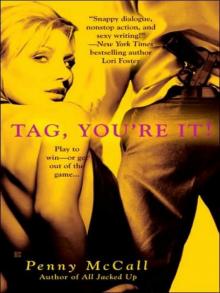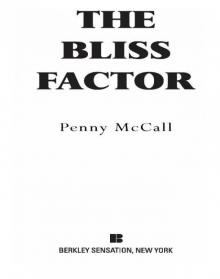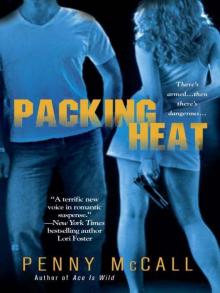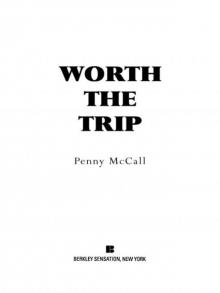- Home
- Penny McCall
The Bliss Factor Page 2
The Bliss Factor Read online
Page 2
chapter 2
IT TOOK ANOTHER HOUR AND A LOT OF AIMLESS wandering, but Rae finally spied her father working at his loom in the shade of a huge, spreading oak next to a small wooden building crammed with wench dresses and jester tights.
“That’s different,” she said, bending to take a closer look at the cloth on his loom, so finely woven she couldn’t see the individual threads.
Nelson Bliss shot to his feet and gathered her close, laughing slightly as he rocked her from side to side, so happy to see her it brought tears to her eyes. She’d never intended to leave her parents behind when she’d run away from the lifestyle. She had, though, and it was moments like this when she understood the price she’d paid for her so-called normalcy.
They broke the hug, Nelson looking down while Rae blinked furiously, both of them avoiding the emotion. Rae might have inherited her mother’s looks, but she’d ended up with her father’s reserve. The nomad gene had bypassed her completely.
“The color’s amazing, Dad,” she said, using the stiff cloth as a tension breaker, then taking a closer look when it really caught her eye, the off-white covered in places by shimmering copper swirls that transformed to a pretty spring green depending on the angle. The colors had been applied more than dyed, she saw before Nelson flipped a piece of rough linen over the loom. “What are you going to make out of it?” she asked him.
“Um . . . It’s a surprise for your mother. Don’t say anything, you know how these people love to gossip.”
“Sure. Is everything okay? You look tired.” He looked more than tired. He looked . . . sick, was her first reaction, followed by a thumping heart and an urge to dial 9-1-1.
He waved her off and turned away. “I’m fine.”
He clearly wasn’t, but when she got past that instant of panic that her father, one of the pillars of her life no matter how far apart they were, was ill, she could tell it wasn’t physical. Something was preying on him, though. New lines of stress wrinkled his forehead and bracketed his mouth, and he looked unhappy and closed off—more than usual.
“Something’s wrong,” Rae said.
Nelson took a deep breath and let it out slowly, his way of calming his nerves. Those nerves wouldn’t have anything to do with her mother. Rae had never known two people so like-minded and so devoted to one another that nothing short of death . . .
Her heart thumped again. “Mom—”
“Your mother’s fine, too. C’mon.” He nipped next door and asked the woman at the dragon candle shop to watch his place, then led Rae a little way down a narrow path running behind the maze of stalls, to a small gate leading back to the twenty-first century, or as close as it got for the hard-core re-enacters and craftspeople who followed the faires from one town to another.
Civilization consisted of a labyrinth of potholed dirt lanes along which RVs, pop-up trailers, campers towed by an assortment of aging vehicles, and various other so-called living quarters rubbed shoulders with each other in an amicable mishmash of a mobile neighborhood. Rae followed her father along the road, picking her way carefully around puddles and large rocks, finally giving up any attempt to spare herself when he went cross-country, taking her through knee-high weeds between a state-of-the-art RV and something resembling a wigwam.
“Here we are,” he said, turning in time to see her holding up the sides of her skirt, surveying the wet, muddy mess of her own bare legs and once pristine shoes.
“I’m sorry,” he said, reaching into his pocket, she thought for a handkerchief. He pulled out a phone instead and flipped it open.
“You have an iPhone? And you know how to text?”
“Things have changed,” he said, looking sheepish. “I’ll give you my number. And your mother’s.”
Too late to keep her from wasting a couple of hours looking for them, not to mention the embarrassment of being accosted by a complete stranger. Except embarrassment wasn’t exactly the residual impression, Rae thought, remembering those warm, hard muscles, and that hot, talented mouth and how strong and broad he’d felt under her hands, how she’d lost her breath and grown dizzy as she fell into him, the sexual spell he cast so overwhelming she forgot where she was, what she was doing, and what kind of kook she was doing it with . . . And then he’d let her go and walked away like she’d been just another woman in the crowd. Which was exactly what she’d been. Her brain got it, flashing back to the snickers and the whispers and the humiliation. Her body held out hope.
She fell into step with her father as he started down the road, trying to eject the armorer from her mind—and any other body parts that were currently re-experiencing that kiss, not to mention all that . . . manhood plastered against her.
She was grateful when her parents’ familiar old Airstream travel trailer, with its lifetime of distracting memories, came into sight. To some it would be vintage, with its shiny aluminum skin and the rounded corners that came straight off a sixties’ drawing board. To her parents it was home, as lovingly cared for as any brick or frame house on a square of suburban lawn. To Rae, it represented the past, okay to visit as long as she didn’t have to stay too long.
“Air-conditioning?” she asked when her father opened the door and coolness flooded out.
“Your mother insisted,” Nelson said. “Something about power surges. I tried to ask her how using more electricity, which only adds to global warming, could possibly be a remedy for power surges. I mean, we only live in this little trailer, but driving it from place to place, using all that fossil fuel, is a big enough carbon footprint, if you ask me, and we use just as much water as anyone else so—”
“Dad.”
The tirade cut off abruptly, Nelson Bliss blinked owlishly at his daughter for a second or two before he remembered where the conversation had started. “You don’t know what she meant, do you?”
Rae almost chuckled, her father was so endearingly clueless. “She was probably talking about hot flashes.”
“Oh,” he said looking relieved. And then the mysterious-female-drama angle hit him, not to mention the fact that he was discussing it with his daughter, and his face turned red. “Ahh . . .”
“The air-conditioning feels good,” she said, putting the conversation back on comfortable ground for them both.
“Just between you and me, it’s kind of nice to come into all this cool after a long day in the heat and the crowds and the dust. Speaking of which, why don’t you clean up while we’re waiting.”
Rae did just that, but she left the bathroom door open. “What’s with all the mystery?” she called out over the sound of running water. Her skirt could be dry-cleaned, but her shoes were a dead loss, waterlogged and mud-stained. She gave up on them and settled for washing the dirt off her legs. “Is Mom okay? Aside from the wonky internal thermostat?”
“Mom is fine, wonky thermostat and all” came an unmistakable voice, the one from all her worst memories. And her best.
Rae poked her head out the bathroom door and there was Annie Bliss, a circlet of flowers on her head, her hair falling in wild curls to her waist, the copper mixed liberally with white strands so shiny it looked more like highlights than gray. She wore a cream-colored peasant blouse under a bright green, ankle-length tunic dress, the hem wet almost to her knees, her bare feet muddy in hemp shoes.
Rae’s suit and leather pumps cost more than her parents made in a week. And she would have given a year’s salary to carry herself with the same confidence, the same disinterest in anyone else’s opinion, as her slim, beautiful mother.
“Sunshine!” Annie Bliss exclaimed, arms out, crowding into the tiny bathroom to hug her only child.
The embrace was just as tight and just as long as her father’s, and Rae felt just as nostalgic, but there was a different dynamic with her mother, a history of conflict that had Rae pulling away sooner.
“I’ve missed you, Sunny.”
“It’s Rae, remember?” she said, avoiding the hand that lifted, not to smooth her hair, but to pull at the cli
p holding it in the sleek bun.
Some children would find it refreshing to have a mother who pushed them to be a free spirit, but Rae had always craved structure. And so she’d rebelled, if you could call it rebellion to refuse to picket and protest. She’d changed her name, for starters. Sunshine Bliss just didn’t suit her. Rae Blissfield was steady and dependable, some might add closed off to that list, maybe even a little repressed and straitlaced. But if other people wanted to label her that was their problem. Rae knew who she was. She’d chosen who she was. How many people could say that?
“I like my hair up,” she said.
“You have such beautiful hair.”
Rae made a face and changed the subject. “Why did you call, Mom?”
Her mother sighed, backing out of the bathroom. Rae followed her down the hallway into the kitchen, even more cramped with three adults crowded into it. Annie stopped by the door, Rae perched on the edge of the bench seat curving round three sides of the table, and her father leaned back against the tiny galley sink, smiling at the two of them falling into the same old routine. And since routine was her thing, how could Rae be angry about it?
“You would have come to visit anyway,” Annie said.
“Yes, but you wanted me here today.”
“Just tell her,” Nelson said.
Rae frowned when Annie stayed uncharacteristically silent. “You know you can tell me anything,” she said. “I mean, we have our moments, but . . . you’re my mom.”
“I’m glad to hear you say that because I have a pretty big favor to ask.”
“That’s an understatement,” Nelson muttered.
The look Annie shot in his direction had him doing an I’m-staying-out-of-it routine—one-shouldered shrug, hands and eyebrows raised, little take-it-away gesture. Annie might be wearing a dress but her status in the marriage was undisputed.
“I was wondering if a friend of ours could stay with you for a little while,” she said to Rae.
“Why?”
“Because we asked for your help.”
“For whom?”
“A friend,” her mother repeated with a bit of an edge to her voice.
“How long?”
“All these questions,” Annie said huffily. “I thought you were an accountant, not a journalist.”
“I’m being asked to take in a complete stranger. It would be nice to have a little information before I make a decision.”
“You know us,” Annie said, sounding and looking hurt.
Rae refused to be manipulated. “I know you, Mom, but I’m not you. I can’t jump first and ask questions later.”
Annie threw up her hands. “Here we go. First you insult me, and next I’ll have to hear how horrible your childhood was.”
Rae looked to her father, staying carefully neutral, then back to her mother. Her first impulse was to defend herself, but that would only take her somewhere she didn’t want to go. Her mother might be unconventional, but she used guilt as well as any churchgoing Catholic. One minute Rae would be giving reassurances and professing her love, the next she’d be agreeing to take in this friend of theirs, no questions asked.
“Who is it?” she asked again. “Why do I need to take him or her in, and for how long?”
Annie dropped the theatrics, pressing her lips together for a second before smiling slightly. “You’re determined to ruin my fun, aren’t you?”
“Fun?”
“I only get to mother you once a year. I was trying to fit it all in.”
Rae had to smile over that. “I’ll consider myself mothered.”
Annie kissed her on the forehead. “Now you can consider yourself mothered.”
Even though Rae was savoring that moment of accord she knew there was some misdirection and manipulation involved, too. “Why can’t this friend of yours stay with you?”
“The trailer isn’t that big, and three’s a crowd,” her father said, winking at her mother.
Rae grimaced, as much for the heat rushing into her cheeks as the ewwwwwfactor. She ought to be past the my-parents-have-sex revulsion. Or maybe a child never got past it, no matter how old they were. “It’s just not a good time,” she said, getting back to the real problem. “I’m up for partner.”
“You’re always up for partner,” Annie said, “and that putz of a boss of yours will never give it to you until you stand up for yourself.”
“I can handle Mr. Putz—Mr. Putnam,” she amended before she started to think of him as Mr. Putz and stood a chance of slipping and actually calling him Mr. Putz to his face because she became pretty absentminded when she was deep into someone else’s finances. “You take care of your stray.”
“It’s life or death—”
“Mom,” she said, making it a three-syllable verbal eye roll.
Annie toned down the drama, but she made up for it with sincerity. Very intense sincerity. She took both her daughter’s hands, squeezing them for emphasis. “He’s special, Sunny.”
A man then, that made things a bit uncomfortable. “I’m not sure—”
“He’s perfectly safe. We’ve known him for . . .”
“What?” she asked when her mother stopped to calculate the time. “A few weeks? You’re probably lucky he hasn’t killed you in your sleep.”
“Three, no four months. And he’s not the first young man we’ve taken under our wings.”
“No, he’s not. You took in strays my whole life, and you were lucky you never got tied up with a bad one.”
“Do you think it was just luck?” Annie demanded “That we would have let anyone near you we weren’t sure of?”
“No,” Rae mumbled, eyes dropping to her lap.
Her mother cupped her cheek. “If I’d had any idea you were frightened, that you didn’t feel safe . . .”
It was worse than that, Rae thought. She’d felt she wasn’t enough for them, that she was a disappointment or they wouldn’t have needed someone else to look after.
“We didn’t need luck,” Nelson said, his calm voice giving more weight to that reassurance than all her mother’s impassioned pleas. “Good and bad, there’s nothing more basic, Sunny, and we learned early on to tell the one from the other, even through camouflage. Life on the road teaches you that quickly or you don’t survive it.”
Rae knew that, and looking back she could see they’d known, somehow, who to trust and who not to. Annie and Nelson Bliss had always been willing to lend a hand to someone deserving, but there’d been times when she was a child when they’d run across someone who’d asked for their help, and help wasn’t given. “I really wish I could give you a hand, but it’s such a bad time . . .”
“It’s only for a few days,” Annie said, “maybe a week, tops.”
A week, she thought, just any week for her parents, but the end of the quarter for her, culminating with the partnership meeting at her firm.
“His name is Connor Larkin,” Nelson said. “He’s a perfect gentleman. Very chivalrous, as a matter of fact.”
Her parents both laughed.
“Care to let me in on the joke?”
Annie opened the door. “Come in, Conn.”
And in he walked, all six and a half feet of him, dark hair waving back from that rugged, almost-handsome face, still wearing leather accessorized by a bandage with a slight seep of blood showing through. Instead of setting off alarm bells, it just seemed to add to the . . . okay, dashing figure he cut.
He stopped just inside the door, as surprised as she was. He recovered in seconds, though, giving her a bow and a flourish while she sat there staring, open-mouthed, heart pounding, nerves throbbing in places that hadn’t throbbed since . . . an hour ago, when he’d kissed her. Before that it had been a long time. A really long time. Too long, if she was throbbing over a man who chose to live his life as an historical anachronism.
“Milady,” he said as he straightened, returning her stare with an irreverent grin. “A pleasure to . . . see you again.”
Those sparklin
g blue eyes dropped to her mouth, her face heated to roughly the temperature of the sun, and she was on her feet, even before she’d formed the intent and despite her suddenly wobbly knees.
“You have got to be kidding,” she said to her mother, but her eyes stayed on the man Annie Bliss had called Conn, which was a pretty apt name for him since Rae felt like she’d been had.
And there stood her parents, acting like it was an everyday occurrence to send a man like that to stay with her. Rae tried to work herself around to the door, hands out to ward them all off before they dragged her into their delusion.
“He looks like he can take care of himself,” she said.
He looked like he could take care of her, too. And she had no business thinking about that kiss, not to mention any other surprises he might come up with if she were stupid enough to let him get that close to her again. “He didn’t have any trouble with those two guys earlier. Wait . . .” Her eyes went to the bandage. “That was real, wasn’t it? They actually wanted to kill him?”
“They only had swords,” her father said.
“They only had . . .” She threw up her hands, wondering why it surprised her that she was the only one who found that comment ridiculous. “What if they come after him with guns next time?”
“Guns?” Conn asked. “What is guns?”
Rae didn’t move, but her eyes shifted to her mother’s face.
“Oh, by the way,” Annie said with an infuriatingly calm smile. “Conn has amnesia.”
chapter 3
“AMNESIA?” RAE STAGGERED BACK TWO STEPS and dropped onto the hard bench seat. Her gaze went to Conn again, still smirking at her but with no sign of prevarication on his face, then to her father, smiling reassuringly.
Annie just looked smug. Rae hated smug. It was the expression she’d seen every time she lost a fight with her mother, which was every time they’d fought. Except that last time, when she’d walked away for good.
Annie’s smile faltered, as if she, too, were remembering where being right all the time had gotten her. “It’s the way between mothers and daughters,” she said.

 Tag, You're It!
Tag, You're It! The Bliss Factor
The Bliss Factor Packing Heat
Packing Heat Worth the Trip
Worth the Trip